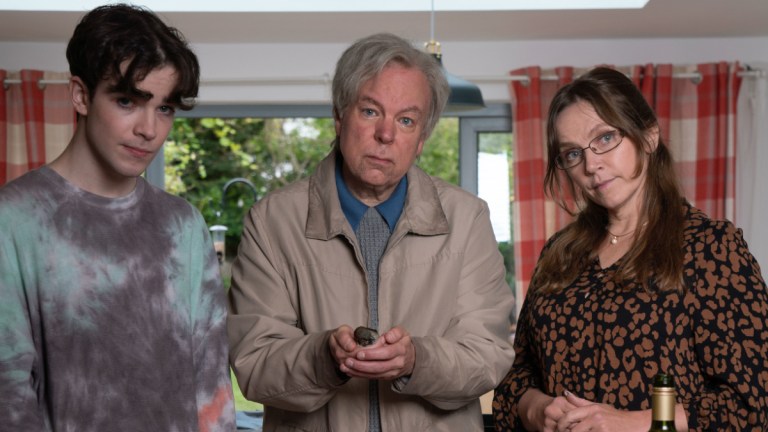Inside No. 9 Series 7 Episode 5 Review: A Random Act of Kindness
Love the BBC as we do for being the home of Inside No. 9, scripts as ingenious as A Random Act of Kindness deserve more investment.

Warning: contains spoilers for Inside No. 9 Series 7 Episode 5
Out in the world of TV and movie production, millions are regularly spent on scripts containing a fraction of the complexity, ambition or potential in ‘A Random Act of Kindness’. Inside No. 9’s first sci-fi story was an imaginative feat frustratingly limited inside a BBC comedy budget.
Given the right backing, this desperately sad tale of a bereaved son’s guilt driving him to invent time travel and sacrifice his life to repair his relationship with his mother would make an excellent feature film. There could be an indie version starring Chloe Sevigny and David Thewlis, or a big Hollywood one perhaps, with Sandra Bullock and George Clooney in the Jessica Hynes and Steve Pemberton roles. Triple the runtime, add a couple of zeroes to the budget, forget about the need to contain all the action inside a ‘number nine’ and you’d really have something.
The big Hollywood version would lose Older-Zach’s suicide and change the ending, of course, following audience testing. Reversing every step the story takes to leave Younger-Zach and his mother back on the path to estrangement and grief wouldn’t play well to a mainstream audience, who might well find the final image of an injured sparrow gasping its last breath to foreshadow Helen’s approaching death-by-cancer and with it, the final nail in the coffin of a difficult mother-son relationship, a bit… agonisingly bleak? I did.
That’s after working out quite what I’d just seen. After Bob’s tattoo revealed him to be future-Zach from 2062, the plot came thick and fast. Bob (Pemberton) delivered his message to Zach (Noah Valentine) about making up with Helen (Hynes) before it was too late, and then he took his own life. That act presumably stopped the original timeline dead, leaving Zach to make up with his mother and embark on a new timeline in which he didn’t co-invent a transtemporal telegraph, but instead cured cancer and saved her. New-timeline Helen died at a ripe old age, Zach grew into a happier man close to his own children, and then a stranger turned up at Helen’s funeral and ruined everything.
That was Dr Brann (Shearsmith). In the original timeline, he and Zach co-developed the time travel device, bringing them fame and wealth. When original timeline Brann learned that Zach was time travelling back to his own past in order to change his future, he realised that his timeline was also about to be discarded as “collateral damage” and so left himself a video message explaining the betrayal before Zach’s suicide ‘deleted’ that version of events.
New-timeline-Dr Brann then sought out this cancer-curing stranger and (this is where I get fuzzy) forced him at gunpoint to use the transtemporal telegraph older-Zach had stashed under younger-Zach’s bed to go back to before older-Zach interfered, thus resetting everything to the status quo. Ergo, Helen still died young, Zach remained wracked by guilt, and the only winner was Dr Brann, who presumably no longer had to make a living out of online educational science videos.
It contained so much – big sci-fi concepts, workplace rivalry, the clever Newton’s laws metaphorical device, story surprises – but at heart was an emotional, down-to-earth story about a mother and son. Hynes’ tender performance as Helen conveyed that emotion beautifully, and her early scenes with Valentine were well-pitched by the actors and Nine Lives Kat director Kieron J. Walsh. Hynes’ naturalism, and the domestic realism of those early scenes couldn’t have contrasted more with the villainous laser-gun fight confrontation at the end.
That’s somewhere more money could have contributed. The design of this episode, with its future-flashback sets, special effects, and Brann’s science vid backdrop, was already extravagant for Inside No. 9. There was no way that final fight also could be staged in the swish, futuristic location where it should by rights have taken place. (If you’re a “world-famous Nobel Prize winner” who literally cured cancer, you can afford to buy your mum a nicer house than the one you grew up in covered in hexagons. It’s this episode that, in true Doctor Who style, couldn’t afford it).
It was an impressive (double-s) half-hour – a smart sci-fi story grounded in a sad domestic drama that was made as well as it could possibly be within the limitations. It’s a rare example though, of an Inside No. 9 episode whose ambition extended beyond what was practically possible. Because while most of this anthology’s stories are cleverly made to work just as well on a taut budget as a generous one, some of these ideas simply deserve more space and time in which to travel.
Inside No. 9 Series 7 concludes on Wednesday the 1st of June at 10pm on BBC Two.
